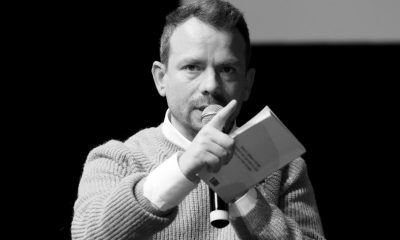corona
#EAPM - Update: Von der Leyen wil 'triljoene' hê vir uiteindelike ekonomiese herstelstrategie (en gesondheidsorg?)

 Over the past few weeks, the European Alliance for Personalised Medicine (EAPM) has been engaging with its members/stakeholders, such as patients, clinicians, researchers etc, on this topic in particular and, perhaps surprisingly, not all feedback and feelings were totally negative, skryf EAPM Uitvoerende Direkteur Denis Horgan.
Over the past few weeks, the European Alliance for Personalised Medicine (EAPM) has been engaging with its members/stakeholders, such as patients, clinicians, researchers etc, on this topic in particular and, perhaps surprisingly, not all feedback and feelings were totally negative, skryf EAPM Uitvoerende Direkteur Denis Horgan.
One of the major perceived ‘plusses’, if that’s not too strong a word given the circumstances, is the fact that the pandemic has certainly shaken up perceptions about how health should be quickly organized and routines updated and upgraded.
Necessity, they say, is the mother of invention and the appearance of the novel corona-virus has certainly forced Europe to look at new ways around how professionele verskaffers van gesondheidsorg can fulfil their sworn duty to pasiënte, and how we all go about fulfilling social contracts and matching deeds with EU principles.
The latter falls heavily on the governments of individual member states - some of whom are felt to have performed well, so far, and others not so well. We’ve all been watching, of course, twitching our metaphorical curtains to see how the powers-that-be in our own country are reacting and whether the job is being done properly.
Lest we forget, it’s nie net journalists, but also ordinary citizens, who are scrutinising governments these days, and many are expressing a less-than 100% confidence in our public systems, which betrays a certain lack of full trust in those that lead us. This hardly helps with medical data privacy issues, for a start.
Despite the fact that medical data has always been handled within robust parameters, the trust that certainly should be there in this context has undeniably suffered due to scaremongering and the type of underlying fear that saw the European Parliament table no less than 4,000 amendments to the General Data Protection Regulation not too long ago.
Obviously, we do not have a perfect system for health (or any other) data, but there has to be an environment of trust for us all to reap the benefits of this huge mountain of key information - much of which can improve the lives, and treatment options, of today’s patients and those that will follow.
Within a democratic EU we have a good system of checks and balances - which generally works through consensus. But, of course, to ensure our much-treasured freedoms, bestuursraamwerks need to be in place.
These topics and many more will be on the agenda at EAPM’s two upcoming Presidency conferences in June and October.
Other developments in health care
According to European Commission chief Ursula von der Leyen (uitgebeeld), The next seven-year EU budget should be used to trigger loads-a-money to help the EU"s economic recovery in a post-Covid world.
"Ons"re not talking about a billion, but we are talking about a trillion, looking at the investment initiative that has to be done," gesê von der leyen during the presentation of her road map for exiting the lockdown.
Keep on tracking
The European Commission has very recently been talking about the use of tracking apps during the COVID-19 crisis. But it’s not the only use of hi-tech devices that are suddenly becoming ‘all the rage’ as telemedicine has been given a major boost due the current circumstances.
Once sceptical and, occasionally, fearful health-care pros have had little choice but to embrace the trend - not least because many of their offices are closed.
It transpires that for, say, normal pregnancies, many obstetricians are now doing most prenatal check-ins via virtual visits. Intussen dermatologists are finding it convenient to diagnose the more-minor vel toestande via the use of cellphone cameras.
Van die kursus, telemedicine is baie meer koste effektief as it means fisiese kontak is nie nodig nie, and it frees up office visits for patients with die meer complex conditions. After-hours care is also made easier which, in turn, leads to less hospital visits from concerned patients.
In respect of hospital beds, meanwhile, most hospitals have now raised the bar on when a bed is required, in order to keep as many as possible available for COVID-19 patients. Very sick non-corona virus patients are still being admitted, of course, but the end result is more beds for those that really need them.
All-in-all it’s been a case of ‘needs must when the devil drives’ with the practical upshot that we have learned once and for all that many, many patients can be behoorlik treated without being hospitalised.
EU pushes Joint Action
A key role of the EU is to promote and encourage soft diplomacy by, for example, supporting organisations such as the WHO, which is currently under (many think unfair) fire from America’s President Donald Trump.
Trump, as we all know by now, wants to withhold funding for WHO pending an investigation into how well, or not, it handled particularly the early stages of the virus outbreak, its competence and ability om op te tree.
As part of a response that has resonated around the globe, the EU'N foreign policy chief Josep Borrell het het gesê hy "deeply regrets” Trump"s decision, Terwyl German government spokesman Steffen Seibert oor gepraat "die belangrikheid" of the WHO.
hy het bygevoeg that Germany will continue "supporting and funding" Dit, and Belgium, alongside many other governments, has said the same.
Whatever criticisms Trump may have - the main issue for most appears to be his idea of timing, namely threatening to block cash from die UN se health organizasie in the middle of a deadly pandemic for which no cure or vaccine has yet been found.
On the plus side, it’s not often we see global solidarity on such a level, eh?
New report on cancer drugs
Moving to cancer, a new OECD report on how it thinks countries can deal with challenges in access to cancer medicines has aanbeveeled that the use of sodanige dwelms should be tracked based on each type of disease they can treat.
Says the report: "This could serve a number of purposes, including informing ex-post price adjustments where needed, and supporting the monitoring of expenditures linked to oncology medicines, as well as contributing to "werklike wêreld" evidence of the performance of medicines. "
The report also calls for improvements to the design of performance-based managed entry agreements by which many new cancer drugs are reimbursed.
"This would require the collection of information on both utilization and relevant clinical outcomes for products subject to these agreements," Dit sê.
Information sharing among payers and countries, particularly for medicines targeting a small number of people, is "hoogs wenslik,” the report adds.
UK extends lockdown measures
And speaking of exit strategies and the like, the UK will not be announcing one any time soon, it seems, despite constant questioning by media reporters on the topic.
Late this week Eerste Sekretaris Dominic Raab (standing in for virus-recovering British Prime Minister Boris Johnson) aangekondig an extenSiO
In the daily briefing to the nation, Raab said that: "Early relaxation would do more damage to the economy over the longer period…The government has decided the current measures must remain in place for at least the next three weeks."
It turns out that Brits are in the main supportive of an extension to the lockdown instrumente, ten spyte van die regering’s lack of an exit strategy.
According to a YouGov poll, 91% of UK citizens asked said they support extending the lockdown measures for a further three weeks.
Meanwhile, also in the UK, we may not have heard much about Brexit of late but there’s a certain related irony to the fact that flights are now being chartered by food companies to fly in migrant workers to help kies vrugte en groente.
Without them to knuckle down and do the job, the crops will be ruined.
It seems a long way from the days when the likes of the Daily Mail were screaming from the rooftops that migrant workers was taking food from the tables of UK citizens by filling the lower-paid, yet necessary, jobs.
nou it seems that the very same migrants will be relied upon to put food on the tables of pro-Brexit Brits, as well as Remainers, while many of those from both camps are currently sitting at home doing their bit to fight the good fight from the comfort of their sofas.
Migrant-picked strawberries and cream, anyone?
Deel hierdie artikel:
-

 NAVO5 dae gelede
NAVO5 dae geledeEuropese parlementslede skryf aan president Biden
-

 Kazakstan5 dae gelede
Kazakstan5 dae geledeLord Cameron se besoek demonstreer belangrikheid van Sentraal-Asië
-

 Tabak5 dae gelede
Tabak5 dae geledeTobaccogate gaan voort: Die intrige geval van Dentsu Tracking
-

 Tabak3 dae gelede
Tabak3 dae geledeDie oorskakeling van sigarette: hoe die stryd om rookvry te word gewen word























